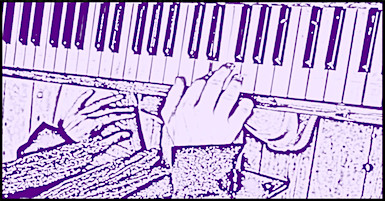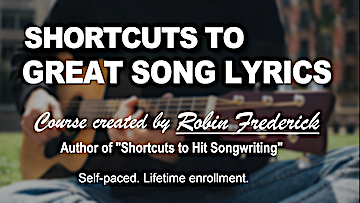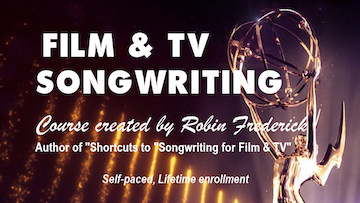I know I give you a lot of advice and sometimes you probably wonder if I know what I’m talking about. (Hey, I wonder the same thing about other people all the time.)
So, in this post, I thought I’d give you songwriting advice that comes straight from the mouths of songwriters and artists with incredibly successful, long-running, world-wide fame and success. I won’t include their bios or track records because you already know who they are. So, here are “7 Habits of Successful Songwriters” straight from the source!
1. DEVELOP A SONGWRITING PROCESS
Your songwriting process is the way in which you approach creating lyrics, melody, and chords. Maybe you’re a lyrics-first person. Or maybe you grab your guitar and come up with a groove and chords first. Here’s how a couple of successful songwriters approach their own songwriting.
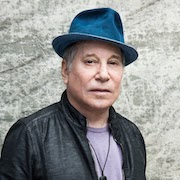
Paul Simon
“I work with my guitar and a legal pad…. I get going fairly early in the morning, because my mind is sharp, and start by dating the pad and putting down personal comments, such as how I am feeling that day, so that it becomes a diary of sorts. … The first page might have all sorts of lines that will never be used, but as I turn the pages, a little thought might come forward and suggest potential for development.” (Making Music, book by George Martin)
________________________
Ryan Tedder (OneRepublic) on writing with Sia
This collaborative songwriting process involved recording everything and then going through it with fresh ears. You can try it on your own, no collaborator needed.
“I did a session with Sia recently, who is amazing. In a 45-minute window, she had recorded 45 different approaches to the same track. You have 20 completely different melodic approaches to the same eight bars of music, then you turn off the creative part of your brain, and turn on the more receptive, objective part. You play back each take and listen to it as a fan. And you’ll go: “OK, the second two bars of that pass are amazing—mark them, keep them.” Then literally you can go through and chop together two bars from take three and two bars from take 11, and you’ve got your verse.” (interview on the BBC)
2. LEARN FROM SUCCESS
Diane Warren
Four decades of hit songs would not have happened if Diane Warren didn’t have the ability—and the desire—to keep her own songwriting contemporary by learning from current hits.
“It’s all about a great song still, no matter what, but you have to stay current. I’ve always been a sponge—musically and lyrically, I’ve always listened to everything. I’m just always aware of what’s going on.” (American Songwriter Magazine)
“You should listen to songs and listen to what works. Listen to why a song is a hit. Check it out—not to imitate it, but there are certain things that work—hooks and melodies. Hear what works through the ages.” (quoted in Performer Magazine)
________________________
3. INSPIRATION IS EVERYWHERE
Bob Dylan on what he learned from Buddy Holly
“[W]hat I got out of Buddy was that you can take influences from anywhere. Like his ‘That’ll Be the Day.’ I read somewhere that it was a line he heard in a movie, and I started realizing you can take things from everyday life that you hear people say…. You can go anywhere in daily life and have your ears open and hear something, either something someone says to you or something you hear across the room. If it has resonance, you can use it in a song.” (Los Angeles Times interview)
________________________
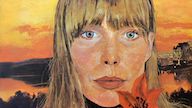
Joni Mitchell
Talking about the inspiration for her first song that caught the attention of listeners, “Clouds.”
“I was up in a plane. I was reading Henderson the Rain King, and in the book he was up on a plane flying to Africa and he looked down on clouds and he mused that he looked up at clouds, but he’d never looked down on them before. So that was where the germ of the idea for the song came from.” (American Songwriter Magazine)
________________________
David Bowie
“I’ve caused a lot of discontent because I’ve expressed my admiration for other artists by saying, ‘Yes, I’ll use that,’ or, ‘Yes, I took this from him and this from her.’ Mick Jagger, for example, is scared to walk into the same room as me even thinking any new idea. He knows I’ll snatch it.” (Playboy Magazine)
4. KEEP IT FRESH BY TRYING NEW THINGS
Don’t get stuck in a songwriting rut. Try new things and see what happens. Keeping your creativity on its toes will give you better results and keep you interested in your songwriting.
Tom Waits
“With instruments, usually your fingers just wanna go back to what they did the last time. I try different tricks to kinda free myself and, you know, pick up an instrument that I’ve never played before, just to have the thrill of unfamiliarity and that feeling of discovery.” (Triple-R interview)
________________________
Lauv
After multiple million-selling, tightly crafted hits, singer-songwriter Lauv decided to try something more relaxed for his second album.
“I was like, yearning for this sense of not thinking at all… Let the moments that are hooky be hooky, let the moments that are wordy be wordy… I was going there myself as a person, spiritually.” (Billboard)
________________________
5. DON’T QUIT JUST BECAUSE IT’S HARD
Sting
“The fact that songwriting can sometimes be very hard, does not mean that you have no talent or you’re doing something wrong…Songwriting, unlike other human pursuits, never gets easier. It is forever a challenge needing to be met.”
“Songwriting is much like trying to catch a wild animal. Only you cannot kill the beast – you have to somehow trick him into being captured. And you can never use the trick twice.” (American Songwriter Magazine)
________________________
Desmond Child
“Live life to the fullest, and then write about it. Dare to suck and put your music out there, and just keep on going.” (Interview with Dale Kawashima, SongwriterUniverse .com)
________________________
Diane Warren
A lot of things have to come into play to make a hit song. I think I know when I’ve written one. But, you know what, someone has to believe in it. You have to get through the politics. You have to convince somebody to do the song. Sometimes they don’t want to do it. I still have to fight for stuff, just to get things to happen. (Billboard, THR’s Magic Hour interview)
6. WRITE WHAT MOVES YOU
Here’s one that everyone agreed on: Writing from your emotions—putting yourself in the moment, being true to yourself—is essential.

“Songwriting comes from an emotion. It comes from a feeling. It comes from something you can’t contain, something that makes you cry, something that makes you laugh, something that you can’t describe because it is like a stone in your chest. It’s some kind of emotion, and it provokes you to find the words.” (CNN)
________________________
Adele
“In order for me to feel confident with one of my songs it has to really move me. That’s how I know that I’ve written a good song for myself—it’s when I start crying. It’s when I just break out in tears in the vocal booth or in the studio, and I’ll need a moment to myself.” (Forbes Magazine)
________________________
Producer Greg Kurstin on songwriting with Adele
“I have to find the right sequence of chords or the beginning of a song that ignites something in her.” (MusicRadar .com)
________________________
Lucinda WIlliams
“I guess you could write a good song if your heart hadn’t been broken, but I don’t know of anyone whose heart hasn’t been broken.”
7. WRITE A LOT OF SONGS
Taylor Swift
“If we are very, very lucky, life will say to us ‘your song is great’. The next thing life will say is ‘What else can you do?’” (Nashville Songwriter Awards)
________________________
So, there they are: The seven habits of successful songwriters. There are other ways of saying them and different ways of putting them into practice, but they all come down to the same thing. These seven concepts are the key to a long, creative, and fulfilling career. Make them part of your songwriting routine and see what happens!
